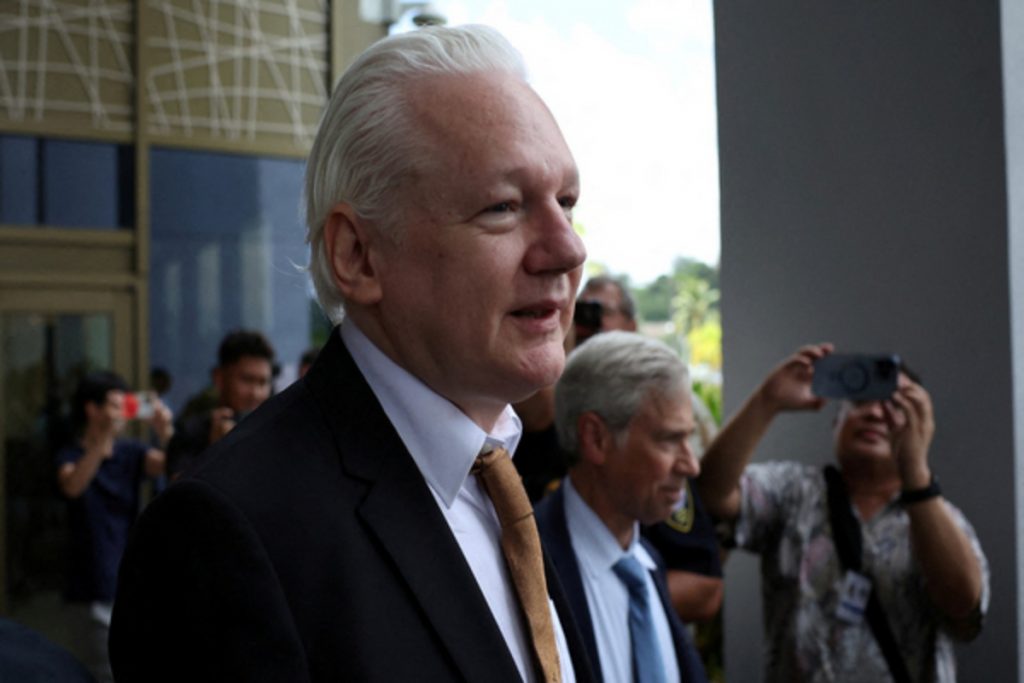WikiLeaks founder Julian Assange walked out of the courtroom in Saipan as a free man for the first time in 12 years after a US judge signed off on his plea deal on Wednesday morning (local time), CNN reported.
Assange walked out of the courtroom as a free man into the bright Saipan sunshine, raised one hand to reporters before leaving in his car for the airport, where he took a flight to the Australian capital Canberra.
Speaking outside the court, Assange’s US lawyer, Barry Pollack, said Assange had “suffered tremendously in his fight for free speech and freedom of the press.”
Speaking to reporters, Pollack said, “The prosecution of Julian Assange is unprecedented in the 100 years of the Espionage Act.” He said, “Mr Assange revealed truthful, newsworthy information… We firmly believe that Mr Assange never should have been charged under the Espionage Act and engaged in an exercise that journalists engage in every day,” according to CNN report.
Julian Assange was released from a high-security prison in London on Monday and had already departed from the UK in a private jet before the world learned about his agreement with the US government.
The 52-year-old Australian appeared in a US courtroom on the Northern Mariana Islands to formalise the agreement. He pleaded guilty to conspiring unlawfully to obtain and disseminate classified information over his alleged role in one of the largest breaches of classified material in US military history.
In the court in Sapian, Assange said, “I am, in fact, guilty of the charge.”
WikiLeaks founder, who has long held a deep mistrust of the US, even accusing it of allegedly planning his assassination, was hesitant about entering the continental US, and so prosecutors requested for all proceedings to take place in a day in a US federal court in Saipan, the largest island and Northern Mariana Islands capital.
US Justice Department prosecutors said the court on the islands made logistical sense as it is near Australia, where Assange will travel after his legal battle ends. Australia’s Ambassador to US, Kevin Rudd, and a former prime minister who helped facilitate negotiations with the US, watched proceedings in the courtroom.
At the start of the hearing, the judge reminded Assange that he was back in the US and that this court was the “smallest, youngest, and furthest from the nation’s capital.” The WikiLeaks founder looked relaxed in the courtroom while he sat next to his attorneys.
Asked by the judge, Ramona Manglona, to speak on what he had done to be charged, Assange responded, “Working as a journalist, I encouraged my source to provide information that was said to be classified in order to publish that information. I believe that the First Amendment protected that activity… I believe the First Amendment and the Espionage Act are in contradiction with each other, but I accept that it would be difficult to win such a case given all these circumstances.”
In her sentencing, Ramona Manglona said Assange was entitled to a credit for the time served for his incarceration at a prison in the UK. The judge said, “It appears that your 62-month imprisonment is fair and reasonable.” She stated, “You will be able to walk out of this courtroom a free man. I hope there will be some peace restored.”
The judge told Assange that “timing matters” and she would have been less inclined to accept a plea 10 years ago. She further said that there was no personal victim in this case, Assange’s action did not result in any known physical injury, CNN reported.
For years, the US said that Julian Assange endangered lives and posed a threat to national security. Assange and his whistleblower website gained attention in 2010 after a series of leaks from former Army intelligence analyst Chelsea Manning related to the wars in Iraq and Afghanistan.
The website shared a video showing a US military helicopter firing on and killing two journalists and several Iraqi civilians in 2007. Several months later, the website disclosed over 90,000 classified Afghan war documents dating back to 2004.
In 2010, Assange was wanted in Sweden to respond to questions over allegations of sexual assault that had emerged. In 2012, Assange sought political asylum within the Ecuadorian embassy in west London. He stayed there for almost seven years until the Metropolitan Police entered his safe haven in 2019, acting on the US Justice Department’s extradition warrant.
UK officers entered his safe haven after Ecuador withdrew his asylum and invited authorities into the embassy, citing Assange’s bad behaviour. Assange had originally been facing 18 criminal charges regarding his organisation’s release of sensitive information into the public domain, according to a CNN report.
As part of the agreement brokered with the US Justice Department, Assange entered a guilty plea to a single criminal charge. His punishment was 62 months in prison. However, he will not have to spend any time in prison in the US, as the sentence equates to the five years he fought extradition while remaining at Belmarsh prison in London. The deal brokered with the US is the final act of a 14-year-old legal battle that has spanned continents.
